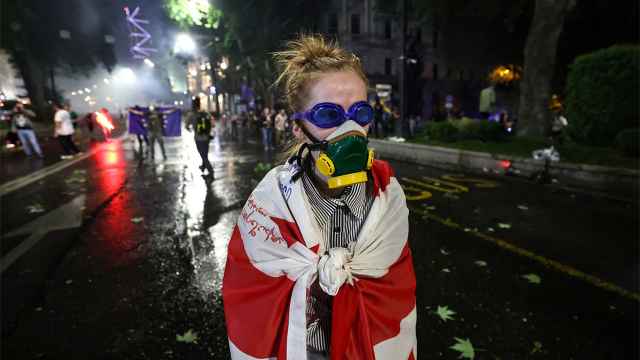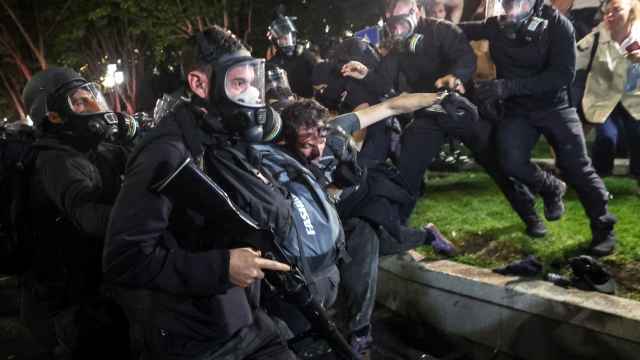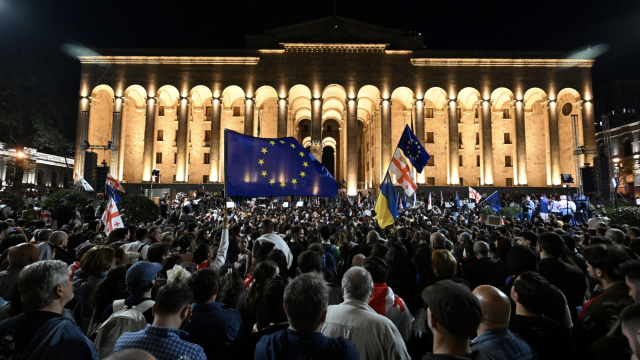Russia on Monday served notice to ex-Soviet Georgia it faces painful consequences if anti-Russian protests are not brought under control, saying it was tightening controls on wine imports that bring Georgia millions of dollars in revenue each year.
Violent protests broke out in front of Georgia's parliament building last week after Russian lawmaker Sergei Gavrilov addressed the Georgian parliament from the speaker's chair, speaking in Russian.
That unleashed simmering resentment among many Georgians, who feel angry and humiliated that they have to maintain friendly ties with Moscow even though Russia briefly invaded their country in 2008 and still backs two breakaway regions of Georgia.
Georgia's president, French-born Salome Zurabishvili, blamed a "fifth column" loyal to Moscow for stirring up the trouble, while Kremlin spokesman Dmitry Peskov said on Monday that "Russophobic hysteria" was being artificially whipped up in Georgia.
The Russian state consumer watchdog, Rospotrebnadzor, said in a statement it was introducing the tougher checks on wine imports because of concerns about the quality of Georgian consignments. Kremlin spokesman Peskov denied any link to the political row.
But Moscow has in the past used bans on wine imports as a weapon in political disputes with Georgia. Russia has already suspended flights to Georgia by Russian airlines, hitting tourism, another major source of revenue for the Georgian economy.
When the protests first erupted on Thursday, police used tear gas and rubber bullets to prevent crowds of protesters from storming Georgia's parliament. Hundreds of people were injured, some seriously.
The protests have quickly developed into a double crisis: pitting Moscow against Tbilisi and pitting the protesters in Georgia against their own government, which has for years tried to smooth over differences with Moscow.
In a move that the anti-government protesters hailed as a victory, the ruling Georgian Dream party said that for the 2020 parliamentary election, the country would switch from a mixed electoral system to a proportional system, with no threshold for parties to get into parliament.
The switch was scheduled to happen anyway in 2024, but the protesters had been demanding that the change be brought forward. A proportional system is likely to make it harder for Georgian Dream to maintain its dominance in parliament without building a coalition.
"This is your first success, first victory," Elene Khoshtaria, a leader of the European Georgia opposition party, said at a briefing, addressing her remarks to the protesters.
She said that the other demand of protesters, the interior minister's resignation, should be also fulfilled. Protests outside parliament are expected to continue on Monday.
Protests continued on Monday. Hundreds of cars and motorbikes drove in the city center, waving national flags and sounding their horns.
A Message from The Moscow Times:
Dear readers,
We are facing unprecedented challenges. Russia's Prosecutor General's Office has designated The Moscow Times as an "undesirable" organization, criminalizing our work and putting our staff at risk of prosecution. This follows our earlier unjust labeling as a "foreign agent."
These actions are direct attempts to silence independent journalism in Russia. The authorities claim our work "discredits the decisions of the Russian leadership." We see things differently: we strive to provide accurate, unbiased reporting on Russia.
We, the journalists of The Moscow Times, refuse to be silenced. But to continue our work, we need your help.
Your support, no matter how small, makes a world of difference. If you can, please support us monthly starting from just $2. It's quick to set up, and every contribution makes a significant impact.
By supporting The Moscow Times, you're defending open, independent journalism in the face of repression. Thank you for standing with us.
Remind me later.







